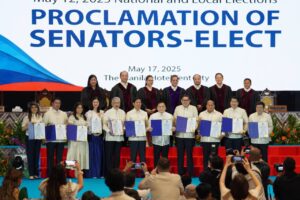The Department of Finance (DOF) is supporting the Philippines’ accession to the Regional Comprehensive Economic Partnership (RCEP), which its chief economist said would help increase goods exports.
“The country could further gain access to export markets by joining trade agreements such as the RCEP,” former DOF undersecretary Gil Beltran said in an economic bulletin on Saturday.
The Senate had yet to concur on the Philippines’ inclusion in RCEP, said to be the world’s biggest free-trade agreement (FTA). which groups the 10 member-states of Asean (Associationof Southeast Asian Nations) plus Australia, China, Japan, New Zealand and South Korea. President Duterte already ratified RCEP in September of last year.
For Beltran, FTAs would help shield the domestic economy from external shocks.
“External risks brought about by a combination of a slowdown in global growth and high inflation in both advanced and emerging economies continue to threaten the Philippine economy’s upward trajectory. As trade activity recovers, we must also remain vigilant and hedge against the lingering threat of COVID-19 and its variants through a sustained vaccination program and a prudent reopening of the economy lest recovery momentum be lost and economic gains go unrealized,” he said.
Key reforms
“Reforms such as the amendments to the Retail Trade Liberalization Act, the Foreign Investment Act and the Public Service Act will be important in fostering an investment-led growth … The next administration should continue and build on the reforms momentum to usher in both investment- and export-led growth,” Beltran added.
Last month, the state planning agency National Economic and Development Authority (Neda) said that “the Philippines’ agricultural sector can further improve if it pursues parallel efforts in fixing structural issues and join the RCEP agreement.”
According to Neda, RCEP “covers roughly 50.4 percent of the Philippines’ export markets and 67.3 percent of the country’s import sources.”
“Joining RCEP will preserve 98.1 percent of tariff lines, which corresponds to 228 commodities or $16.9 billion of imports. Only 15 agricultural commodities representing 33 tariff lines will see lower tariff rates. They account for only 1.9 percent of total tariff lines and only $132 million or 0.8 percent of total agricultural imports. These commodities will be affected since RCEP rates for these items are generally lower than the most favored nation rate and lower than the Asean+1 rate,” according to Neda. INQ



